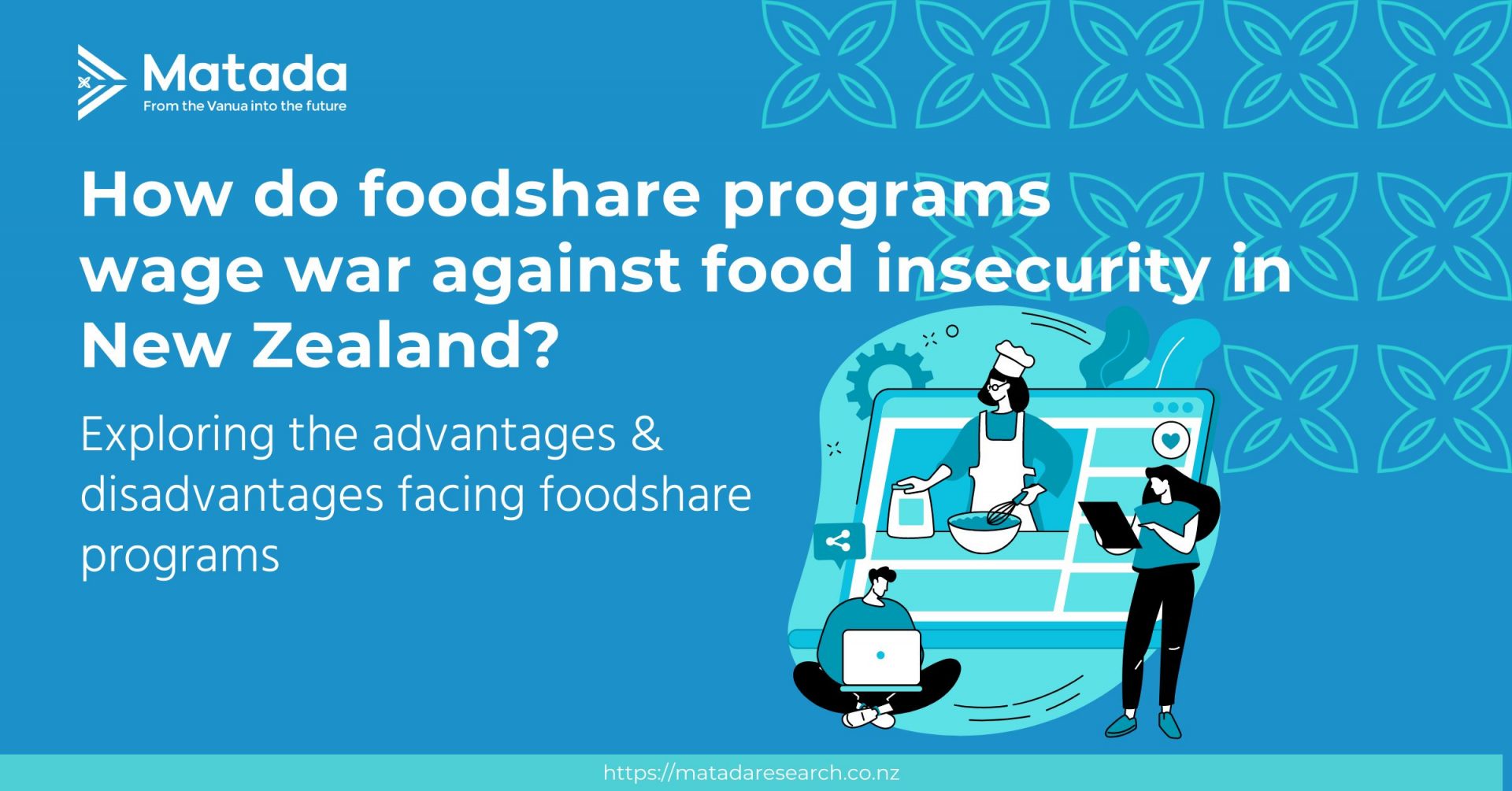Food security in New Zealand is a critical issue; with income inequality, poverty and persistent hunger continuing to be a problem, foodshare programs are becoming increasingly necessary to address food insecurity. These initiatives bring together producers, distributors and consumers to build an equitable and sustainable food system. In this article, we’ll explore how these programs can make a difference in ending food insecurity in New Zealand, discuss the challenges they face, and look towards how they could help create a brighter future for all. By investigating their current efforts at reducing inequality and supplying healthy meals for those without access or resources, we hope to gain insight into what more needs to be done to achieve lasting change.
What is food insecurity
Food insecurity, defined as a lack of access to enough food for all household members to lead an active and healthy lifestyle, is a huge issue in New Zealand. Food insecurity affects a high proportion of the population in high-income countries. The United Nations Children’s Fund (UNICEF, 2018) reported that 14% of the New Zealand population as food insecure. Food insecurity is highest among people with lower incomes. For example, as much as 43% of households with incomes lower than NZ$ 50,000 are food insecure. This is comparatively higher with households earning incomes with more than NZ$ 50,000 where 8.3% of households experience food insecurity. The situation is worse with single parent households where 38% of households experience food insecurity as compared to 12.7% of two-parent households.
Although food insecurity has increased among all socio-demographic groups in New Zealand, young people from Maori and Pacific communities have been the most severely affected (Utter et al., 2017). According to a survey conducted by the Ministry of Health in 2019, as many as 28.6% of the Maori population and 37.1% of the Pacific population reported experiencing food insecurity. Moreover, food insecurity disproportionately affects children. According to Utter et al. (2017), over 40% of New Zealand’s secondary school students reported concerns regarding food security, indicating a significant increase from a decade earlier in 2007.
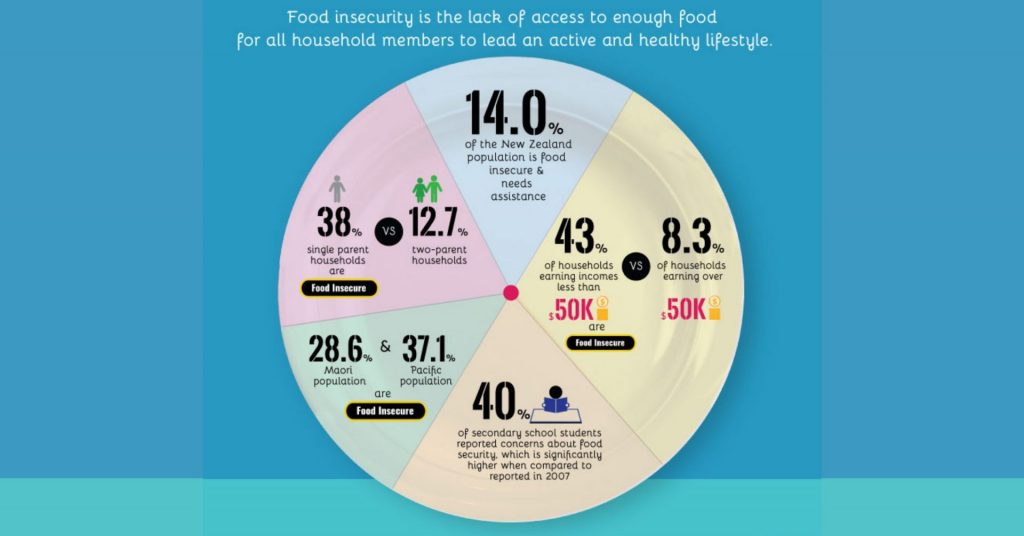
Why is food insecurity important?
Food insecurity has far-reaching consequences beyond a person’s dietary intake. Its long-term social impacts include reduced educational attainment, poorer physical health and mental wellbeing, significant financial strain, and psychological distress. In particular, food insecurity is associated with a range of indicators of poor health and well-being, particularly among adolescents and young adults. Those experiencing food insecurity are at a higher risk for poorer mental health, skipping school, and having inadequate diets. Furthermore, food insecurity can contribute to poor academic achievement and family stress, exacerbating the adverse effects on the health and well-being of children and adolescents (Utter et al., 2017).
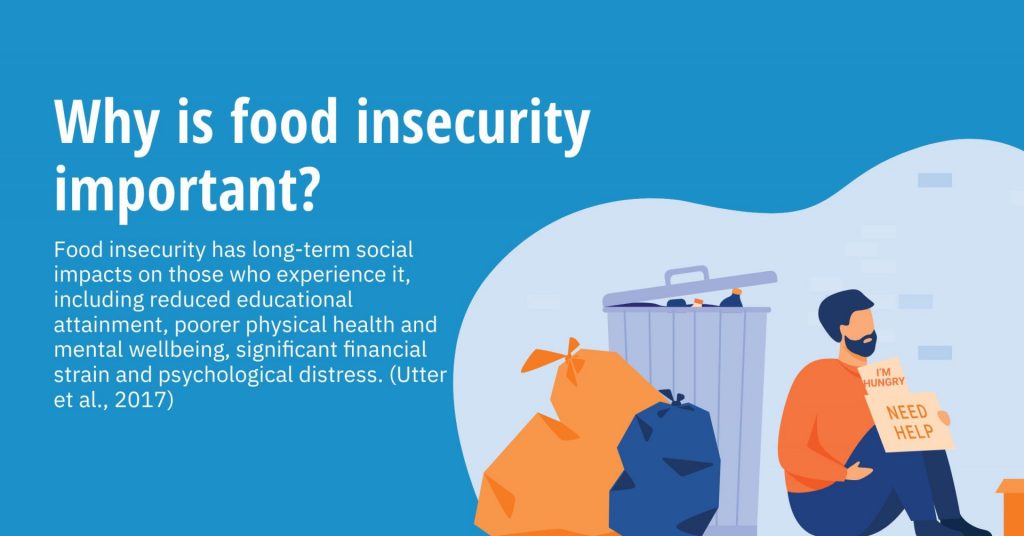
How do foodshare programs combat food insecurity?
Foodshare programs provide immediate relief for those in need through emergency grocery packages, cooked meals, and other short-term assistance. These initiatives also offer long-term support through educational workshops, nutrition classes, and food safety training, which can help individuals escape food insecurity in the long run by improving their knowledge about healthy diets, kitchen hygiene, and budgeting skills.
In addition to nourishing individuals and improving their skills, local foodshare programs promote transparency and accountability, ensuring that donations are efficiently used and avoiding duplication of services or waste. This focus on efficiency means that donations go directly towards helping families in need rather than on unnecessary overheads.
Foodshare programs operate on both the local and national levels, providing direct access to nutritious foods for those in immediate need through initiatives such as Farmers Markets, school meal programs, food pantries, and nutrition education. At the national level, strategies include government subsidies for purchasing food products and research on reducing food waste before it enters the supply chain.Ultimately, the goal of these programs is to ensure that every family has access to necessary resources for physical and emotional well-being. With the combination of local and national approaches, foodshare programs can create a universal solution to help families in need.
An evaluation of a foodshare program implemented in New Zealand showed that participants saw improved levels of wellbeing. This improvement was due to a reduction in stress related to financial insecurity. The recipients of food in this foodshare program also experienced increased level of social connectedness in addition to improved nutrition as a result of the program (Mirossa et al., 2016).
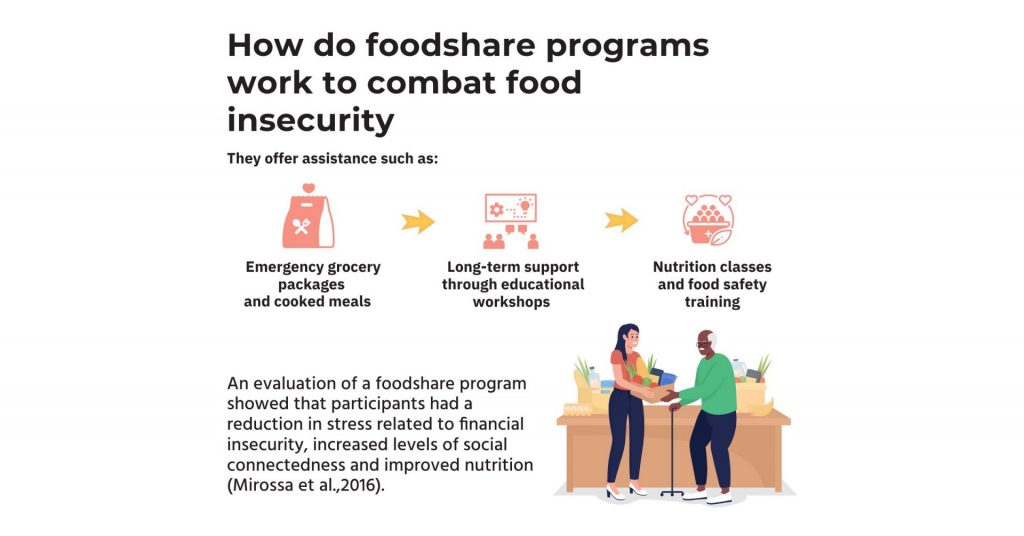
What are examples of foodshare programs available in New Zealand
- Brown Butterbean Motivation (BBM) kitchen and foodshare initiatives in Auckland Foodshare initiatives are entirely run by volunteers with the aim of promoting and maintaining nutrition security within the local community. By providing support to those in need, BBM’s Community Kitchen and Foodshare work towards building a more equitable and sustainable local food system.
- Kaibosh Food Rescue aims to achieve zero food poverty and zero food waste by linking surplus food from the food industry with community groups that support those in need. With branches in Wellington, Lower Hutt, and Paraparaumu, Kaibosh distributes surplus food to charities and community groups and operates with a team of over 170 volunteers. Their services are free of charge to food donors, charities, and community groups.
- The Auckland City Mission offers food assistance to the Auckland CBD community. In addition to serving the local population, the organisation has partnered with three other groups to extend its reach and provide food parcels to whānau in their respective local communities outside the CBD. By collaborating with these partner organisations, the Auckland City Mission Foodbank is able to make a meaningful impact on a wider range of individuals and families who may be experiencing food insecurity or other challenges.
- The Christchurch City Mission offers a compassionate and effective response to those facing food insecurity by providing emergency food relief. They take a one on one approach to their support to gain an understanding of unique circumstances to offer targeted support.
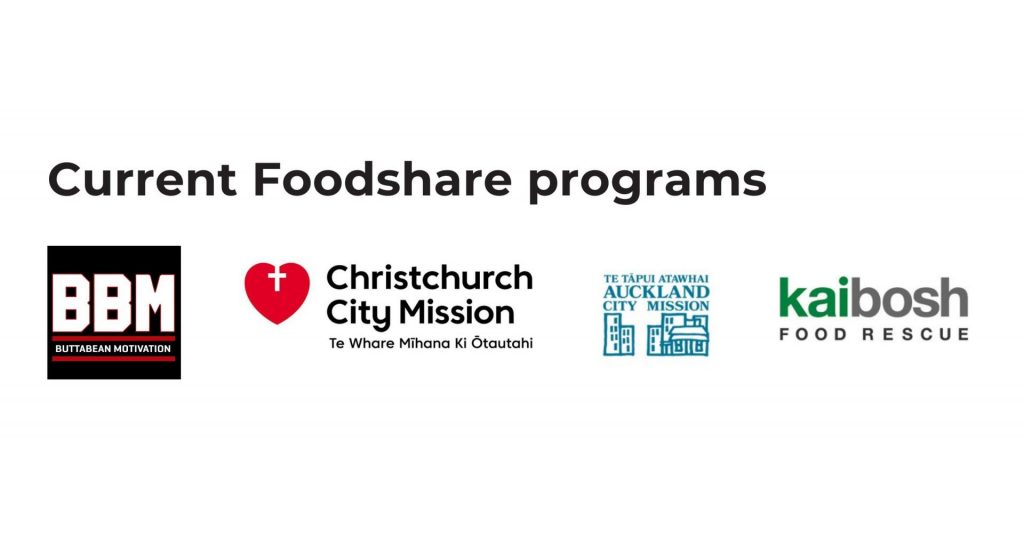
What are advantages of foodshare programs
Food share programs provide nutritious meals and food supplies at reduced costs or free of charge to those who may not be able to afford healthy food. These programs offer access to fresh produce, proteins, dairy items, and other nutritious foods, helping people stay within their budget while maintaining a healthy diet. Moreover, food share programs help reduce the environmental impact of food production by utilizing donated or locally sourced food, which lessens the use of resources such as excessive packaging and transportation. Food share programs also promote a sense of community by connecting families with limited resources with local suppliers who can assist them in obtaining adequate nutrition for themselves and their families.
Evidence from the United States indicates that food share programs have enabled individuals with limited financial resources to purchase essential, nutritious food that promotes good health (Wisconsin Department of Health Services, 2023). In New Zealand, evidence suggests that food share programs not only address food insecurity but also generate substantial social, nutritional, and environmental benefits within the local community where they are implemented (Mirossa et al., 2016).
What are the disadvantages of foodshare programs
Foodshare programs are an incredibly valuable resource that allow families in need to access free, nutritious food. However, there are some disadvantages associated with these programs that must be considered.
Firstly, foodshare programs rely heavily on donations from other people, meaning the types and quantity of food items may not always be predictable or reliable. Secondly, a lack of fresh items and foods with high nutritional value may leave those in need of assistance unable to fully supplement their diets. Lastly, due to budget constraints and limited customer service staff, navigating and accessing these services can often be difficult for those unfamiliar with the system.
Food share programs have certain drawbacks and limitations. Firstly, these programs may not be sufficient for several households as many vulnerable groups may have limited eligibility, according to Keith-Jennings et al. (2019). Secondly, there are concerns that such programs could lead to increased expenses for the state, disincentives to work, and social stigma. Thirdly, participation in these programs may require individuals to share personal information such as employment and income, leading to potential privacy concerns Wolfe (2018).
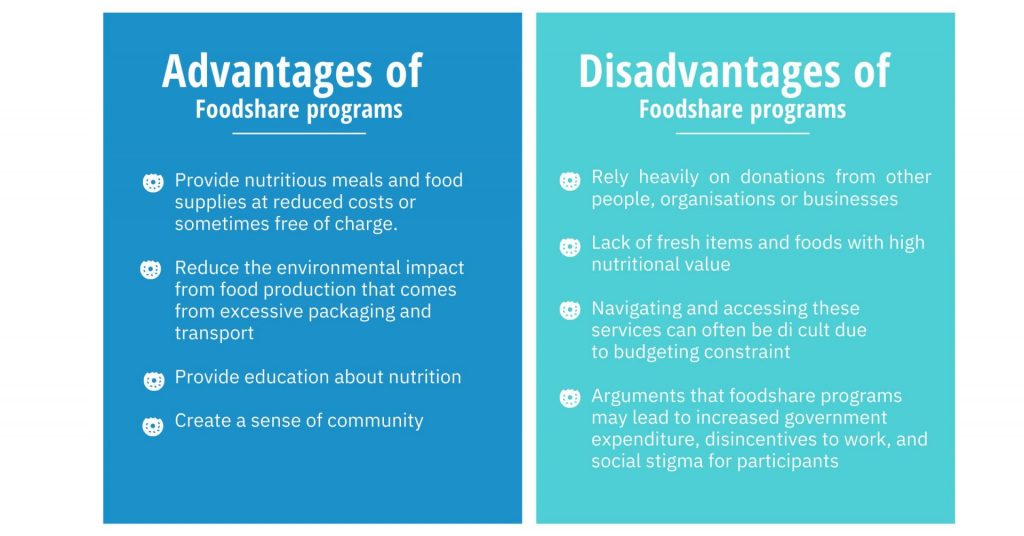
Conclusion & Solutions
Foodshare programs are an invaluable resource for those families who cannot afford to always purchase adequate nutrition. These services offer access to nutritious meals and food items at discounted or free prices in addition to providing education about proper nutrition. While there are some disadvantages that must be taken into account, like limited selection and difficulty accessing the services, these shortcomings do not diminish the importance of foodshare programs in tackling barriers to food insecurity faced by so many families around the world. Ultimately, these efforts help ensure that everyone has access to nutritional resources, no matter their financial situation.
Consequently two possible policy based solutions could be feasible. The first solution involves implementing mobile foodshare programs that deliver nutritious food items to underserved areas or communities using a food truck or van. By partnering with local food banks and community organizations, this solution can offer a wider selection of food items, increase the reach of foodshare programs, and provide education about proper nutrition. The second solution is to implement incentive programs for farmers to donate their surplus produce to food banks and foodshare programs. This approach can increase the availability of fresh and nutritious food items, reduce food waste, and support local farmers.
Governments can provide funding to organizations that operate the food truck or van and collaborate with local farmers and food banks to identify the types of produce that are most needed to implement these policy solutions.
References
Keith-Jennings, B., Llobrera, J., & Dean, S. (2019). Links of the Supplemental Nutrition Assistance Program with food insecurity, poverty, and health: Evidence and potential. American Journal of Public Health, 109(12), 1636-1640.
Mirosa, M., Mainvil, L., Horne, H., & Mangan-Walker, E. (2016). The social value of rescuing food, nourishing communities. British Food Journal, 118(12), 3044-3058. http://dx.doi.org/DOI%2010.1108/BFJ-04-2016-0149
Ministry of Health. (2019). Household food insecurity among children: New Zealand Health Survey – Summary of findings. Ministry of Health.
United Nations Children’s Fund. (2018). The state of food security and nutrition in the world 2019. FAO. https://www.unicef.org/reports/state-of-food-security-and-nutrition-2019
Utter, J., Izumi, B. T., Denny, S., Fleming, T. & Clark, T. (2017). Rising food security concerns among New Zealand adolescents and association with health and wellbeing. New Zealand Journal of Social Sciences Online, 13. 29-38. https://doi.org/10.1080/1177083X.2017.1398175
Wisconsin Department of Health Services. (2023, February 27). FoodShare: A recipe for good health. Wisconsin Department of Health Services. https://dhs.wisconsin.gov/foodshare/index.htm

